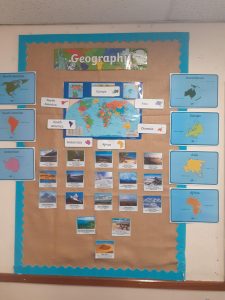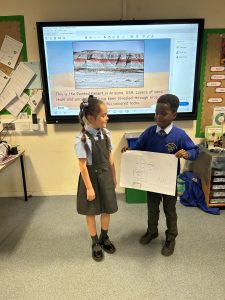Geography Lead – Mrs Spittlehouse
Whole School History Geography Plan 2025 26
Two-year-plan-Geography-25 26 27
Saints Peter and Paul Geography progression map
School Curriculum Geography Progression map ELY
Geography_CP_Overview_Option_1
Intent
At Saints Peter and Paul, we aim for a high quality Geography curriculum which should inspire in pupils a curiosity and fascination about the world and its people. Children are encouraged to develop a greater understanding and knowledge of the world, as well as their place in it.
Our teaching equips pupils with knowledge about places and people; resources in the environment; physical and human processes; formation and use of landscapes. We also want children to develop geographical skills: collecting and analysing data; using maps, globes, aerial photographs and digital mapping to name and identify countries, continents and oceans; and communicating information in a variety of ways. We want children to enjoy and love learning about geography by gaining this knowledge and skills, not just through experiences in the classroom, but also with the use of fieldwork and educational visits.
Implementation
How Geography is taught at St. Peter and Paul Catholic Primary School:
Our Geography curriculum aims to enthuse children and allow them to develop their skills as geographers.
Geography is taught following the National Curriculum Programme of Study. Teachers use planning from the Plan Bee Scheme to ‘help’ plan and develop lessons.
Geography is taught in blocks throughout the year, so that children achieve depth in their learning. Two Geography topics are covered each year within KS1 and additional Geography is also taught through Literacy. Within KS2, Geography is taught three times a year discreetly and additionally through other subjects such as Literacy. Topics are taught one afternoon per week, across a half term. Geography topics focus on developing mapping skills, understanding of the world, physical geography skills and vocabulary.
The Geography curriculum has been carefully built, to ensure progression of key knowledge, skills and vocabulary, across topics throughout each year group, across the school. Topics have been organised on a two year cycle due to mixed age classes.
Key stage 1
Pupils should develop knowledge about the world, the United Kingdom and their locality. They should understand basic subject-specific vocabulary relating to human and physical geography and begin to use geographical skills, including first-hand observation, to enhance their locational and place knowledge.
Key stage 2
Pupils should extend their knowledge and understanding beyond the local area to include the United Kingdom and Europe, North and South America. This will include the location and characteristics of a range of the world’s most significant human and physical features. They should develop their use of geographical knowledge, understanding and skills to enhance their locational and place knowledge.
Within Early Years
Within Early Years Geography is taught through Understanding of the world. Understanding the world involves guiding children to make sense of their physical world and their community through opportunities to explore, observe and find out about people, places, technology and the environment
https://assets.publishing.service.gov.uk/government/uploads/system/uploads/attachment_data/file/596629/EYFS_STATUTORY_FRAMEWORK_2017.pdf
Impact
We use both formative and summative assessment information in every geography lesson. Staff use this information to inform their short-term planning. This helps us provide the best possible support for all of our pupils, including the more able. The assessment milestones for each phase have been carefully mapped out and further broken down for each year group. This means that skills in geography are progressive and build year on year.
Teachers use, geography formative assessment grids, to systematically assess what the children know as the topic progresses and inform their future planning. These formative assessment grids then inform summative assessment judgements for each topic.
Assessment information is collected at the end of each topic. Teachers identify which children are working below, working towards, working at and greater depth against key objectives for each topic. This information in transferred onto subject spread sheets and from here we can analyse number of children achieving at each level. Plus, looking at groups of children e.g. boys v girls. This process provides an accurate and comprehensive understanding of the quality of education in geography. A comprehensive monitoring cycle is developed at the beginning of each academic year. This identifies when monitoring is undertaken. Monitoring includes: book scrutinies, lesson observations and/or learning walks, pupil voice and staff voice.
All of this information is gathered and reviewed. It is used to inform further curriculum developments and provision is adapted accordingly.
The impact and measure of this is to ensure that children at Saints Peter and Paul are equipped with geographical skills and knowledge that will enable them to be ready for the curriculum at Key Stage 3 and for life as an adult in the wider world.
- Children will achieve age related expectations in Geography at the end of their cohort year.
- Children will retain knowledge that is pertinent to geography with a real life context.
- Children will understand how geography ‘happens’ in their local area.
- Children will have a good understanding about the world around them and how it has been shaped.


